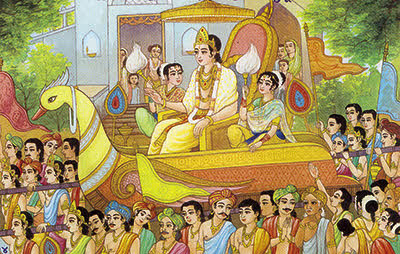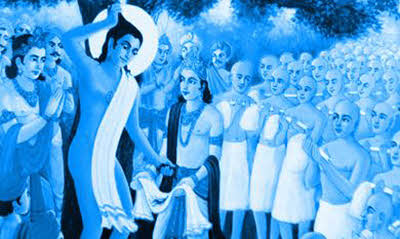
The Master then summoned his vassals, etc., from all quarters; and Bharata and his other sons, Bahubali, etc. The Lord addressed Bharata, “Son, take our kingdom. Now I intend to assume the sovereignty of self-restraint.” At this speech of the Master, Bharata stood for a moment with his face downcast; then bowed, his hands folded together, and spoke in a choked voice: “Even as there is happiness for me in falling before the foot-stool of your lotus-feet, so there is none for me seated on the jeweled lion-throne, O Master. Even as there is happiness for me running on foot before you, O Lord, so there is none for me mounted on the shoulder of a pleasure elephant. Even as there is happiness for me clinging to the shadow of your lotus-feet, so there is none for me covered by the shadow of the white umbrella. If I should be deprived of you, what use would I have for the glory of sovereignty? The pleasure of sovereignty is like a drop in the Ocean of Milk of your service.” The Master said, “In any case, we are resigning the kingdom. In the absence of a king, the law of the fishes prevails on earth. Therefore, son, control this earth properly. You are obedient. This is our command.”
Unable to transgress the Lord’s unalterable command, he agreed. Such, indeed, is the proper behavior toward superiors. Bowing his head before the Master in Reverence, Bharata then adorned his father’s lofty lion-throne, as well as his noble stock. At the Master’s command, Bharata’s consecration was made by ministers, vassals, and generals, just as that of the Lord had been made by the gods. Then an umbrella resembling the full moon shone over Bharata’s head, like the Master’s unbroken command. At his sides shone two waving chauris, like two messengers who had come from the future Sris of the two halves of Bharata. The son of Vrsabha shone with garments and pearl-ornaments that were like his own exceedingly pure virtues. From a desire for their own prosperity the circle of kings paid homage to the new king, a suitable recipient of great honor like the new moon.
Next the Lord apportioned fittingly territories among his other sons, Bahubali, etc. Then the Lord, like a wishing-tree, commenced bestowing gifts on men for a year, in accordance with their unrestricted requests. “Everyone may take whatever he desires.” The Lord had a proclamation to this effect made aloud at the crossroads, city-gates, etc. The Jrmbhaka gods, sent by Kubera at the order of Vasavas, collected treasures, silver, gold, jewels, etc., everywhere, those that had been lost for a long time, disappeared, whose owners were missing, whose landmarks were completely destroyed, those inside mountains and bowers, concealed in cemeteries, and hidden in houses, and bestowed them as a gift on the Lord, like clouds giving water. Daily, the son of Nabhi gave away one crores and eight lacs of gold between sun-rise and meal-time (i.e. sunset). In the course of the year the son of Nabhi gave away three hundred eighty eight crores and eighty lacs of gold. The people in whom the Master’s initiation had produced disgust with existence took only the remains of the sacrifice nothing more, even though they might have taken at will.
Then at the end of the giving that lasted for a year, Vasava’s throne shook; and he approached the Blessed One, like another Bharata in devotion. Together with the chief-gods, who held pitchers in their hands, he made the ceremony of the initiation of the Lord of the World like his coronation ceremony. The Lord of the World quickly put on divine garments, ornaments, etc., brought by Balarin like an official. Haris had made for the Lord a litter, named Sudarsanas, like a palace of the Anuttaravimanas. Supported by Mahendra, the Lord ascended the litter like the first flight of stairs to the house of moksa. The litter was lifted in front by mortals with hair erect from joy, as if it were a load of their own merit embodied, and at the back it was carried by immortals. Choice auspicious musical instruments, played by the gods and asuras, filled the skies with sounds like Puskaravartaka rains. At the sides of the Lord of the Three Worlds, a pair of chauris shone like the personified spotlessness of this world and the next. Crowds of gods, like Bards of the Lord, made loud cries of “Hail! Hail!” delighting the ears of men. As the Lord went on the way, seated in the litter, he looked like an eternal image in a palace of the highest gods.

When they saw the Blessed One coming like that, all the citizens ran after him eagerly, like children after a father. Some men climbed on the branches of tall trees to see the Master from afar, like peacocks to see a cloud. Some, who had climbed to the tops of houses on the road to see the Master, considered the intense heat of the sun like the heat of the moon. Some, unable to endure the delay, did not mount horses, but themselves skipped rapidly along the road like horses. Some, from a desire to see the Master, penetrated the crowds, as heat penetrates water, and appeared in front. Some women, running around the Lord of the Three Worlds, threw handfuls of parched rice, as it were, from their necklaces broken from haste. Some, from a desire to see, went in front of the Lord and stood with children on their hips, like branches of trees with monkeys seated on them. Some, who were inactive from the burden of their breasts, hurried, clinging to the arms of friends on both sides as if they had made wings. Some women, from longing for the moment of seeing the Lord, reviled their hips weights obstructing their gait. Some high-born women in the houses on the road, clothed in auspicious safflower color, made a full dish of offerings, resembling twilight with the moon. Some coquettish eyed women shook the ends of their garments, like chauris, with their lotus-hands at the sight of the Lord. Some women threw parched rice around the son of Nabhi, as if ardently sowing the seeds of merit for themselves. Some sang blessings and speeches, such as “Long live! Long rejoice!” just like women with living husbands to their own families. The women of the city followed, looking at the Lord, some with fixed glance, some with restless glance, some going quickly, some going slowly.
Then the gods of the four classes assembled in the sky, making a single shadow on the earth’s surface with their large cars. Some of the highest gods, who came flying with elephants raining ichor, made the sky appear filled with clouds. Others, who had whips as oars, flew to see the Lord by means of the best horses boats in the Ocean of the sky. Some approached Nabhi’s son in chariots with remarkable speed like the winds personified. The gods did not wait for each other, not even for friends, as if they had made bets on a vehicle-race. Saying to each other, “There is the Master! There is the Master!” the gods stopped their vehicles, like travelers who had reached a village. Then there was a second Vinita in the sky, as it were, with cars as palaces, elephants, horses, and chariots.
The Lord of the World was surrounded by eminent gods and men, like the peak of Manusottara by suns and moons. Attended by Bharata and Bahubali at his sides, Rsabha bannered looked like the Ocean with its banks. The Master of the World was followed by his other ninety eight reverent sons, like the lord of the herd by elephants. His mother, wives, daughters, and other women followed the Lord in tears, resembling lotuses with dew-drops. The Lord of the World halted in a garden Siddhartha by name, which resembled the heavenly palace Sarvarthasiddhi of a former birth. Completely indifferent, the son of Nabhi descended from the jewel of a litter, as if from samsara, under an asoka-tree. At once the son of Nabhi abandoned all clothes, wreaths, ornaments, as well as the passions.

The Lord of the gods placed on the Lord’s shoulder a devadusya, soft, white, fine, as if sewn with moon-beams. Then on the dark eighth of Caitra, the moon being in conjunction with the constellation Uttarasadha, observed by men and gods pouring forth exceeding joy, as it were, in the guise of the rising tumult of cries of “Hail! Hail!” the Lord tore out the hair of his head in four handfuls, as if intending to give the remains of the sacrifice to the four quarters. The Lord of Saudharma catches in the hem of his garment the Lord’s hair which made an ornament with thread of a different color. As the Lord of the World was on the point of pulling out the rest of his hair in a fifth handful, Namucidvis asked him, “O Lord, this hair-creeper brought by the wind to your golden shoulders shines like an emerald. So let it remain.” The Lord kept the creeper of hair just as it was. Masters do not refuse a request from those who are completely devoted.
After the Lord of Saudharma had thrown the hair in the Ocean of Milk and returned, he stopped the tumult by a gesture of his hand like a stage-director. After fasting for three days and making the namaskrti to the siddhas, in the presence of gods, asuras, and men, saying “I renounce all censurable activity,” the son of Nabhi adopted good conduct which is like a chariot on the road to moksa. For a moment even the hell-inhabitants had happiness from the Master’s initiation-festival, like those burned by autumn-heat from the shadow of a cloud. The Lord’s manahparyaya- knowledge, which makes clear the mind-Substance146 of the human world, arose just as if it had an appointment with the initiation.
Opposed by friends, hindered by relatives, and restrained even by the Lord of Bharata again and again, recalling the former wonderful favor of the father Master, unable to bear separation from his lotus-feet like bees, abandoning sons, wives, and sovereignty as easily as a straw, saying resolutely, “Whatever may be the Master’s course, that alone is ours,” four thousand kings, Kaccha, Mahakaccha, etc., joyfully took initiation. For that is the proper conduct of servants.
STUTI
The gods, Sachinatha and others, bowed to Adinatha and with folded hands recited a hymn of praise as follows: “We are unable to describe your qualities fittingly. Nevertheless, we praise them. For knowledge becomes great by your power. Reverence to thee, sole bestower of the gift of fearlessness by the avoidance of injury to lives, both movable and immovable. Reverence to thee, an Ocean of the nectar of suitable, truthful, and pleasant speech by the complete renunciation of falsehood. Reverence to thee, O Lord of the World, first traveler on the road through the waste-land of refusal to take what had not been given, O Blessed One. May Reverence be thee, O Blessed One, sun with the great brilliance of unbroken chastity, destroyer of the darkness of love. Reverence to thee, whose mind is on emancipation, abandoning simultaneously all possessions, the earth, etc., like grass. Reverence to thee, bull for the load of the great vows, tortoise for the crossing of the river of samsara, great souled. Reverence, Reverence to thee, Adinatha, observing the five cares that are like sisters to the five great vows. Reverence to thee possessing the three controls, your mind on the supreme spirit alone, your speech controlled, all action ceased.” After praising the Lord thus in a fitting manner, the gods went to Nandisvara, just as for the bath-festival. After bowing to the Lord, Bharata, Bahubali and the others, like the gods, went unwillingly to their respective abodes.











No comments yet.
Leave a comment